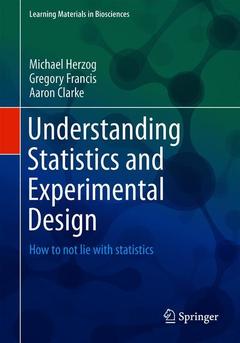Understanding Statistics and Experimental Design, 1st ed. 2019 How to Not Lie with Statistics Learning Materials in Biosciences Series

Part I.- Basic Probability Theory.- Experimental Design and the Basics of Statistics: Signal detection Theory (SDT).- The Core Concept of Statistics.- Variations on the t-test.- PART II.- The Multiple Testing Problem.- ANOVA.- Experimental design: Model Fits, Power, and Complex Designs.- Correlation.- PART III.- Meta-analysis.- Understanding replication.- Magnitude of excess success.- Suggested improvements and challenges
Greg Francis is a professor of Psychological Sciences at Purdue University. His primary area of research develops and tests computational neural network models of human visual perception. A secondary area of interest explores how to identify faulty uses of statistics, such as publication bias and questionable research practices. He also applies cognitive models to topics in human factors and develops on-line teaching tools.
Aaron Clarke is a professor at Bilkent University. He is a psychologist by training with a special emphasis on computational neuroscience and statistics.
Date de parution : 08-2019
Ouvrage de 142 p.
16.8x24 cm
Disponible chez l'éditeur (délai d'approvisionnement : 15 jours).
Prix indicatif 52,74 €
Ajouter au panier


